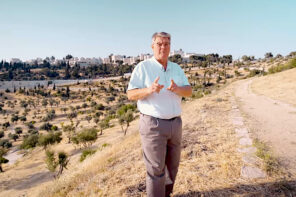Last week the New York Times and the Israeli newspaper Ha’aretz reported that President Obama will not go to the Western Wall when he visits Israel next week.
An official who spoke to the Times framed this lacuna in the president’s itinerary as a security issue, explaining that the difficulty of protecting the president near the site was too great. And other presidents, including Bill Clinton in 1996, have not visited the Wall either. In general there has been little response, positive or negative, to the news that the president would not go to the Wall. But Americans and Israelis concerned with civil rights in Israel should be applauding the news, because there are many good reasons why President Obama should not visit the Western Wall.
The New York Times quoted Israeli ambassador to the U.S. Michael Oren as saying, “Everything on the Seder table—from the lamb shank to the parsley to the egg—is rife with symbolism. So, too, with every item on the president’s itinerary.”
This is a timely comparison—Passover is just around the corner. But importantly, Passover is a holiday that celebrates freedom and recalls the exodus from Egypt as a moral parable, admonishing us to treat the stranger in our midst with respect—while the Wall, especially in the last year, has become a symbol of the opposite, the impediment to civil and human rights created by the Israeli civil government’s entanglement with official state religion.
The Western Wall is a remnant of the retaining wall that surrounded the courtyard of the ancient Temple in Jerusalem. For centuries, it has been a site for Jewish pilgrimage and worship, one of the holiest places on earth for Jews. Since the Six-Day War in 1967, the Western Wall and the area around it has been under Israeli control. Today, the Wall and the area nearby, including the plaza in front of it, is administered by the Rabbi of the Western Wall and the Holy Sites of Israel, Shmuel Rabinowitz. The Rabbi of the Western Wall, like other local rabbis in Israel, is a state appointee, an employee of the Ministry of Religious Affairs.
The area immediately in front of the Wall is divided into men’s and women’s sections, in accordance with traditional Jewish practice. But even in the surrounding plaza, men and women are forbidden from praying together, and women are also forbidden from praying in ways traditionally (although not halakhically, or according to Jewish law) reserved for men, even on the women’s side of the partition. This means that women are not allowed to read from the Torah, wear prayer shawls or phylacteries.
These regulations were codified in 1990 in response to a petition to the High Court of Justice by the group Women of the Wall. In 1988, a group of women who were a part of the first International Jewish Feminist Convention went to the women’s side of the Wall and began to read Torah. They were met with ridicule and abuse, verbal and physical. In defiance, a group of women began going to the Wall every Rosh Chodesh, the festival marking the new moon that has traditionally been a women’s holiday, to pray together.
When they were met repeatedly with abuse and the police refused to help, they petitioned the High Court as the group Women of the Wall. In the intervening years, Women of the Wall have twice petitioned the High Court, and the Court has ruled that the government must establish a committee to resolve the issue by offering a solution that allows the women to pray at the Wall. Since 1997, the women have been allowed to pray at Robinson’s Arch, a site to the south of the Wall, but not at the Wall itself.
Every month, the Women of the Wall continue to meet and pray together on Rosh Chodesh, and periodically some of them are arrested, typically for a short period, and released. In February, however, the organization was catapulted into the news when Rabbi Susan Silverman, the sister of the American comedian Sarah Silverman, was arrested along with her teenage daughter as they prayed at the Wall on Rosh Chodesh.
Silverman tweeted her support for her sister and niece, and suddenly the story was being reported in every major news outlet. Early this month, several members of the Knesset joined the Women of the Wall and their supporters in a larger demonstration than usual. No arrests were made, largely due to the presence of the Knesset members, who have immunity from arrest and searches. In response to the March service, Rabbi Rabinowitz said, “The Western Wall is the only place shared by all the people of Israel—and it is not the place to decide or express a world view.”
In this case, that “world view” is the basic notion of freedom of religion, enshrined in the first amendment to the United States Constitution. Women of the Wall have been agitating for the basic civil right to worship freely for 24 years, but Israel lacks both a constitution and a basic law separating the functions of synagogue and state.
Religious freedom is not only the first right mentioned in the Bill of Rights, but it one of Americans’ most closely guarded liberties. While the Western Wall remains under the administration of a state-sponsored religious entity that prohibits the free worship of its citizens, President Obama should not visit the site. To do so would be a tacit endorsement of the laws and policies that limit civil liberties in Israel in favor of religious control of public prayer, life-cycle events, and, in cases involving conversion, even questions of citizenship.
The White House may cite security concerns, but a visit to the Western Wall would be a misstep for a president who claims to support freedom and equality while the Women of the Wall still struggle for basic religious freedoms in Israel.




